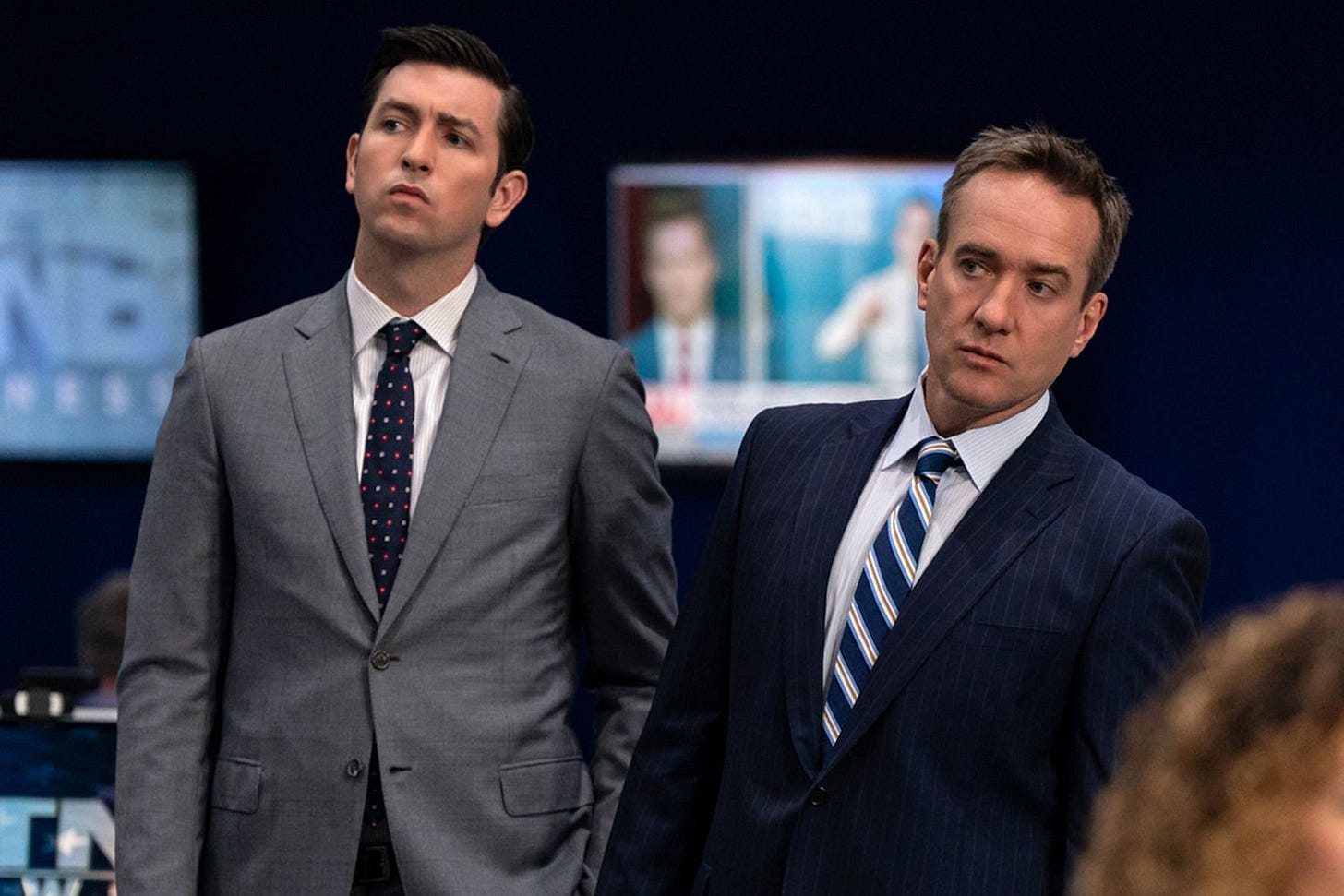Tropes put the fun in dysfunctional: Kaos in Succession
Just in time for the holidays! Let's examine common tropes in family dynasties.
It’s late November, which means we’re officially hurtling toward the end of 2024. But it’s not over yet! Last week, I was in Las Vegas for Author Nation, which was a fantastic con experience. It was great to meet new author friends and visit with long-time writing peeps. Thank you to everyone who staggered into my Tropes: Everywhere, Everything, All At Once workshop at day one’s conclusion. Talking about tropes with other authors is always a good time; doing so in person is a real treat!
Now, in less than a week, most of us will gather together in some way to celebrate Thanksgiving. Since such gatherings are ripe with potential relationship conflict (research), I wanted to share my thoughts about the power of tropes. I’ve recently binged on Netflix's Kaos, a modern-day spin on the Greek Gods that shares more than a few passing tropes with HBO’s Succession. I’ve loved these shows and recommend them highly as entertaining, detailed examples of relationships.
It’s been a minute since I talked about why tropes matter. I see the power of tropes as three-fold:
1). Tropes are universally understood
Anyone with a sixth-grade reading level quickly understands tropes such as loner, orphan, and secret. Thanks to fairy tales, even small children understand these concepts. Think of how parents in most Disney films are quickly dispatched so the story gets moving—sending our vulnerable protagonists on their journey is a great hook.
But intact families provide plenty of conflict. In Kaos and Succession, powerful families struggle to maintain their legacy and survive as a unit. Both Zeus and Logan Roy are alpha holes who face threats from the mere mortals (or scheming family members) around them. They only know family and business as intertwined, and disappointment is rife; as Logan Roy reminds his children, "I love you, but you’re not serious people." Trying to win approval (or love) when your boss is your father fuels these storylines.
Two additional tropes exist in both stories. Tropes such as forced proximity keep characters interacting through holidays and other special events. It doesn’t matter if characters are trapped in a penthouse or the Underworld; there is no escaping the churn. Adding the ticking time bomb trope (ie as in special events, marriage, birth, death) to forced proximity only increases the pressure. It’s all about power; who will remain in power or ascend?
2). Neutral story building blocks
Although these two stories relate to the struggles of influential people, the tropes they are built on don’t have a value judgment. Tropes in themselves aren’t good or bad. They are ideas we can color with our storytelling details and often stack them together. Spouses betray each other. Rivals work together. The fated mates trope applied to Succession’s Shiv, Tom, Orpheus, and Riddy. Dionysus embarks on a journey to win his father’s respect (or at least attention). That journey has positive and negative outcomes for him (and indeed, things don’t go well for Dennis), but his quest to help Orpheus creates a ripple effect on the other characters. Zeus fears a prophecy (MacGuffin) that he’ll lose power. From his viewpoint, that is a catastrophe, but those plotting against him view it otherwise. Zeus is an antagonist to his family, his best friend, and humans, but he doesn’t view himself as a villain. He’s shaping his world as he sees fit, precisely like Logan Roy. His employees who played boar on the floor probably disagree on the villain aspect.
3). Relationships
Tropes are relationships. That’s why we inherently understand them; they are our stories' foundations. We need to see relationships in action; tropes help us show, don’t tell. Look at how, in Succession, Tom and Cousin Greg’s relationship progresses. When Greg first shows up, he’s treated with disdain by the real Roys (Logan’s children), yet his family connection is enough to threaten Shiv’s future husband, Tom. He views the hapless Greg as a threat and bullies him. For his part, Greg is more tenacious than he appears. And the two men are more similar than Tom is willing to admit. They are thrown together initially and circled back to each other in times of turmoil and treachery.
Their uneasy alliance fluctuates from struggling to be seen as a real Roy (across the gap) to rivals. Their relationship became a fan favorite because of their shared vulnerability. Power is behind all the plotting; that is what relationships are based upon. Tom and Greg are eager to gain a firm foothold in the Roy family’s shifting power dynamics. Using secrets, blackmail, and more than a few cons, they finally reach a level of trust between them (mainly that either will sell out the other if the opportunity arises).
During an extended family member’s Tuscan wedding, Tom asks Greg if he wants to side with the devil by betraying Logan’s adult children. To which Greg replies, what was I going to do with a soul anyway? We see these two characters step into their power, and Tom even offers Greg a Greg of his own, assuredly to bully. The pattern of having someone more vulnerable to play with continues. Such good stuff!
This year as you sit down to Thanksgiving, remember as you pick a cat hair from Aunt Myrtle’s famous cheeseball or are threatened with inheriting various outdated, unwanted, and most undoubtedly heavy family heirlooms, these relationships are goldmines for storytellers. Get ready to dig in.
.





